Question Number 106409 by bemath last updated on 05/Aug/20
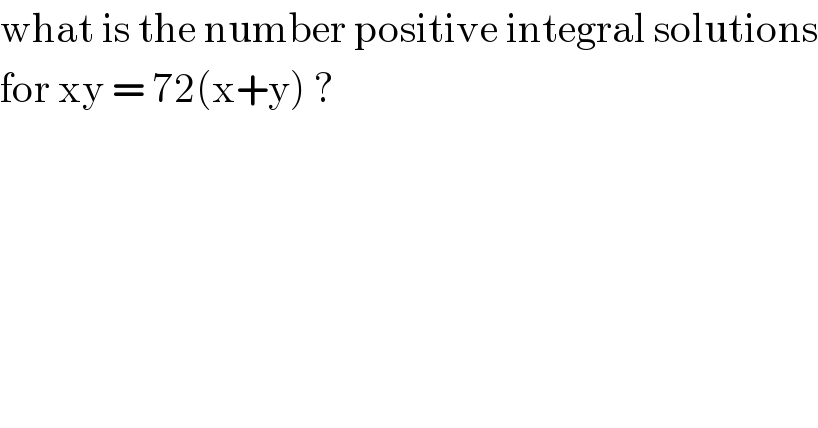
$$\mathrm{what}\:\mathrm{is}\:\mathrm{the}\:\mathrm{number}\:\mathrm{positive}\:\mathrm{integral}\:\mathrm{solutions} \\ $$$$\mathrm{for}\:\mathrm{xy}\:=\:\mathrm{72}\left(\mathrm{x}+\mathrm{y}\right)\:? \\ $$
Answered by 1549442205PVT last updated on 05/Aug/20
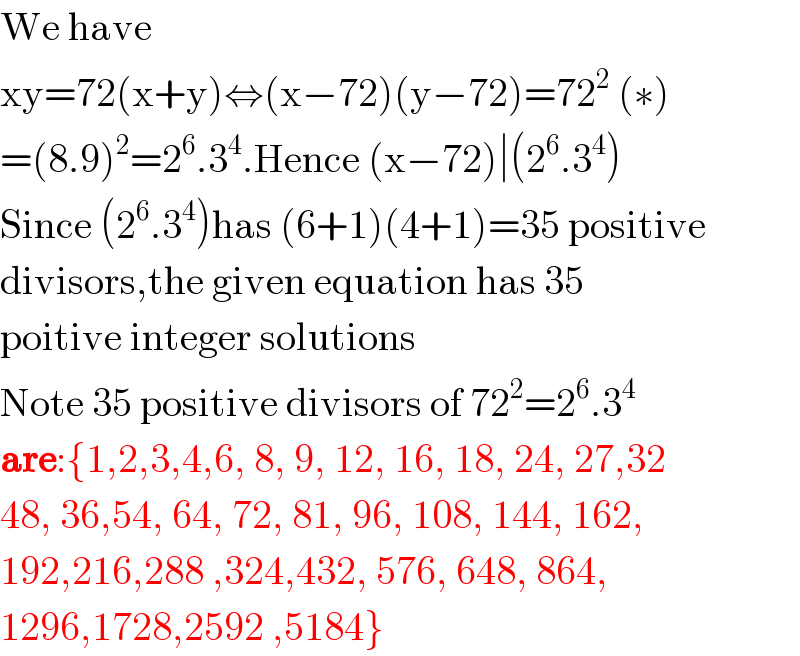
$$\mathrm{We}\:\mathrm{have}\: \\ $$$$\mathrm{xy}=\mathrm{72}\left(\mathrm{x}+\mathrm{y}\right)\Leftrightarrow\left(\mathrm{x}−\mathrm{72}\right)\left(\mathrm{y}−\mathrm{72}\right)=\mathrm{72}^{\mathrm{2}} \:\left(\ast\right) \\ $$$$=\left(\mathrm{8}.\mathrm{9}\right)^{\mathrm{2}} =\mathrm{2}^{\mathrm{6}} .\mathrm{3}^{\mathrm{4}} .\mathrm{Hence}\:\left(\mathrm{x}−\mathrm{72}\right)\mid\left(\mathrm{2}^{\mathrm{6}} .\mathrm{3}^{\mathrm{4}} \right) \\ $$$$\mathrm{Since}\:\left(\mathrm{2}^{\mathrm{6}} .\mathrm{3}^{\mathrm{4}} \right)\mathrm{has}\:\left(\mathrm{6}+\mathrm{1}\right)\left(\mathrm{4}+\mathrm{1}\right)=\mathrm{35}\:\mathrm{positive} \\ $$$$\mathrm{divisors},\mathrm{the}\:\mathrm{given}\:\mathrm{equation}\:\mathrm{has}\:\mathrm{35} \\ $$$$\mathrm{poitive}\:\mathrm{integer}\:\mathrm{solutions} \\ $$$$\mathrm{Note}\:\mathrm{35}\:\mathrm{positive}\:\mathrm{divisors}\:\mathrm{of}\:\mathrm{72}^{\mathrm{2}} =\mathrm{2}^{\mathrm{6}} .\mathrm{3}^{\mathrm{4}} \\ $$$$\boldsymbol{\mathrm{are}}:\left\{\mathrm{1},\mathrm{2},\mathrm{3},\mathrm{4},\mathrm{6},\:\mathrm{8},\:\mathrm{9},\:\mathrm{12},\:\mathrm{16},\:\mathrm{18},\:\mathrm{24},\:\mathrm{27},\mathrm{32}\:\right. \\ $$$$\mathrm{48},\:\mathrm{36},\mathrm{54},\:\mathrm{64},\:\mathrm{72},\:\mathrm{81},\:\mathrm{96},\:\mathrm{108},\:\mathrm{144},\:\mathrm{162}, \\ $$$$\mathrm{192},\mathrm{216},\mathrm{288}\:,\mathrm{324},\mathrm{432},\:\mathrm{576},\:\mathrm{648},\:\mathrm{864}, \\ $$$$\left.\mathrm{1296},\mathrm{1728},\mathrm{2592}\:,\mathrm{5184}\right\} \\ $$
Commented by Rasheed.Sindhi last updated on 05/Aug/20

$$\mathrm{xy}=\mathrm{72}\left(\mathrm{x}+\mathrm{y}\right)\Leftrightarrow\left(\mathrm{x}−\mathrm{72}\right)\left(\mathrm{y}−\mathrm{72}\right)=\mathrm{72}^{\mathrm{2}} \:\left(\ast\right) \\ $$$$\:\:\:\:\:\:\:\:\:\:\:\:\:\:\:\:\:\:\:\:\:\:\:\:\:\:\:\:\:\:\:\:??? \\ $$
Commented by bemath last updated on 05/Aug/20
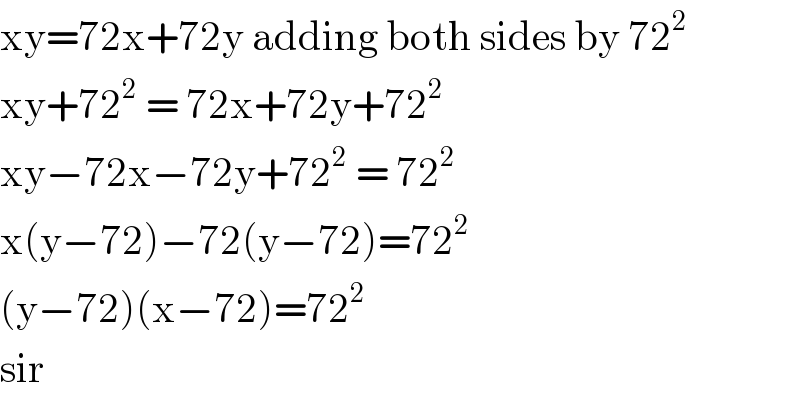
$$\mathrm{xy}=\mathrm{72x}+\mathrm{72y}\:\mathrm{adding}\:\mathrm{both}\:\mathrm{sides}\:\mathrm{by}\:\mathrm{72}^{\mathrm{2}} \\ $$$$\mathrm{xy}+\mathrm{72}^{\mathrm{2}} \:=\:\mathrm{72x}+\mathrm{72y}+\mathrm{72}^{\mathrm{2}} \\ $$$$\mathrm{xy}−\mathrm{72x}−\mathrm{72y}+\mathrm{72}^{\mathrm{2}} \:=\:\mathrm{72}^{\mathrm{2}} \\ $$$$\mathrm{x}\left(\mathrm{y}−\mathrm{72}\right)−\mathrm{72}\left(\mathrm{y}−\mathrm{72}\right)=\mathrm{72}^{\mathrm{2}} \\ $$$$\left(\mathrm{y}−\mathrm{72}\right)\left(\mathrm{x}−\mathrm{72}\right)=\mathrm{72}^{\mathrm{2}} \: \\ $$$$\mathrm{sir}\: \\ $$
Commented by Rasheed.Sindhi last updated on 05/Aug/20

$$\mathcal{T}{hank}\:{you}\:{bemath}\:{sir}! \\ $$
Commented by Rasheed.Sindhi last updated on 05/Aug/20

$${V}.\:{Nice}\:{sir}\:\mathrm{1549}… \\ $$
Answered by Rasheed.Sindhi last updated on 05/Aug/20
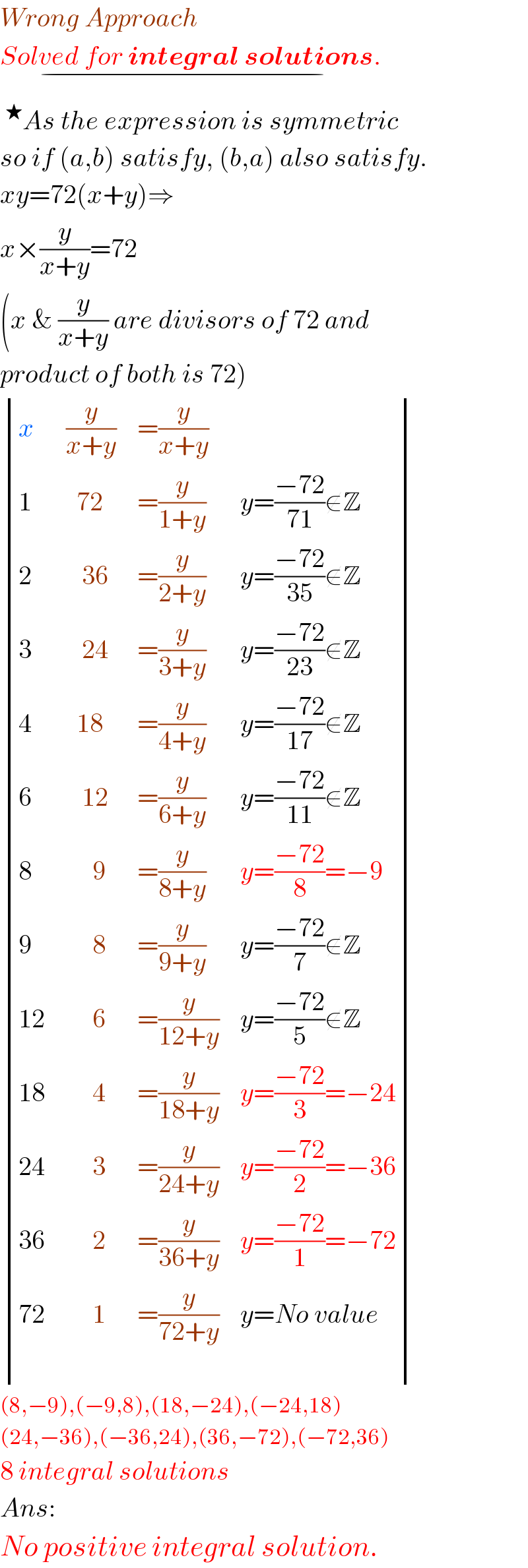
$${Wrong}\:{Approach} \\ $$$$\underset{−} {{Solved}\:{for}\:\boldsymbol{{integral}}\:\boldsymbol{{solutions}}.} \\ $$$$\:^{\bigstar} {As}\:{the}\:{expression}\:{is}\:{symmetric} \\ $$$${so}\:{if}\:\left({a},{b}\right)\:{satisfy},\:\left({b},{a}\right)\:{also}\:{satisfy}. \\ $$$${xy}=\mathrm{72}\left({x}+{y}\right)\Rightarrow \\ $$$${x}×\frac{{y}}{{x}+{y}}=\mathrm{72} \\ $$$$\left({x}\:\&\:\frac{{y}}{{x}+{y}}\:{are}\:{divisors}\:{of}\:\mathrm{72}\:{and}\right. \\ $$$$\left.{product}\:{of}\:{both}\:{is}\:\mathrm{72}\right) \\ $$$$\begin{vmatrix}{{x}}&{\frac{{y}}{{x}+{y}}}&{=\frac{{y}}{{x}+{y}}}&{}\\{\mathrm{1}}&{\:\:\mathrm{72}}&{=\frac{{y}}{\mathrm{1}+{y}}}&{{y}=\frac{−\mathrm{72}}{\mathrm{71}}\notin\mathbb{Z}}\\{\mathrm{2}}&{\:\:\:\mathrm{36}}&{=\frac{{y}}{\mathrm{2}+{y}}}&{{y}=\frac{−\mathrm{72}}{\mathrm{35}}\notin\mathbb{Z}}\\{\mathrm{3}}&{\:\:\:\mathrm{24}}&{=\frac{{y}}{\mathrm{3}+{y}}}&{{y}=\frac{−\mathrm{72}}{\mathrm{23}}\notin\mathbb{Z}}\\{\mathrm{4}}&{\:\:\mathrm{18}}&{=\frac{{y}}{\mathrm{4}+{y}}}&{{y}=\frac{−\mathrm{72}}{\mathrm{17}}\notin\mathbb{Z}}\\{\mathrm{6}}&{\:\:\:\mathrm{12}}&{=\frac{{y}}{\mathrm{6}+{y}}}&{{y}=\frac{−\mathrm{72}}{\mathrm{11}}\notin\mathbb{Z}}\\{\mathrm{8}}&{\:\:\:\:\:\mathrm{9}}&{=\frac{{y}}{\mathrm{8}+{y}}}&{{y}=\frac{−\mathrm{72}}{\mathrm{8}}=−\mathrm{9}}\\{\mathrm{9}}&{\:\:\:\:\:\mathrm{8}}&{=\frac{{y}}{\mathrm{9}+{y}}}&{{y}=\frac{−\mathrm{72}}{\mathrm{7}}\notin\mathbb{Z}}\\{\mathrm{12}}&{\:\:\:\:\:\mathrm{6}}&{=\frac{{y}}{\mathrm{12}+{y}}}&{{y}=\frac{−\mathrm{72}}{\mathrm{5}}\notin\mathbb{Z}}\\{\mathrm{18}}&{\:\:\:\:\:\mathrm{4}}&{=\frac{{y}}{\mathrm{18}+{y}}}&{{y}=\frac{−\mathrm{72}}{\mathrm{3}}=−\mathrm{24}}\\{\mathrm{24}}&{\:\:\:\:\:\mathrm{3}}&{=\frac{{y}}{\mathrm{24}+{y}}}&{{y}=\frac{−\mathrm{72}}{\mathrm{2}}=−\mathrm{36}}\\{\mathrm{36}}&{\:\:\:\:\:\mathrm{2}}&{=\frac{{y}}{\mathrm{36}+{y}}}&{{y}=\frac{−\mathrm{72}}{\mathrm{1}}=−\mathrm{72}}\\{\mathrm{72}}&{\:\:\:\:\:\mathrm{1}}&{=\frac{{y}}{\mathrm{72}+{y}}}&{{y}={No}\:{value}}\end{vmatrix} \\ $$$$\left(\mathrm{8},−\mathrm{9}\right),\left(−\mathrm{9},\mathrm{8}\right),\left(\mathrm{18},−\mathrm{24}\right),\left(−\mathrm{24},\mathrm{18}\right) \\ $$$$\left(\mathrm{24},−\mathrm{36}\right),\left(−\mathrm{36},\mathrm{24}\right),\left(\mathrm{36},−\mathrm{72}\right),\left(−\mathrm{72},\mathrm{36}\right) \\ $$$$\mathrm{8}\:{integral}\:{solutions} \\ $$$${Ans}: \\ $$$${No}\:{positive}\:{integral}\:{solution}. \\ $$
Commented by Her_Majesty last updated on 05/Aug/20
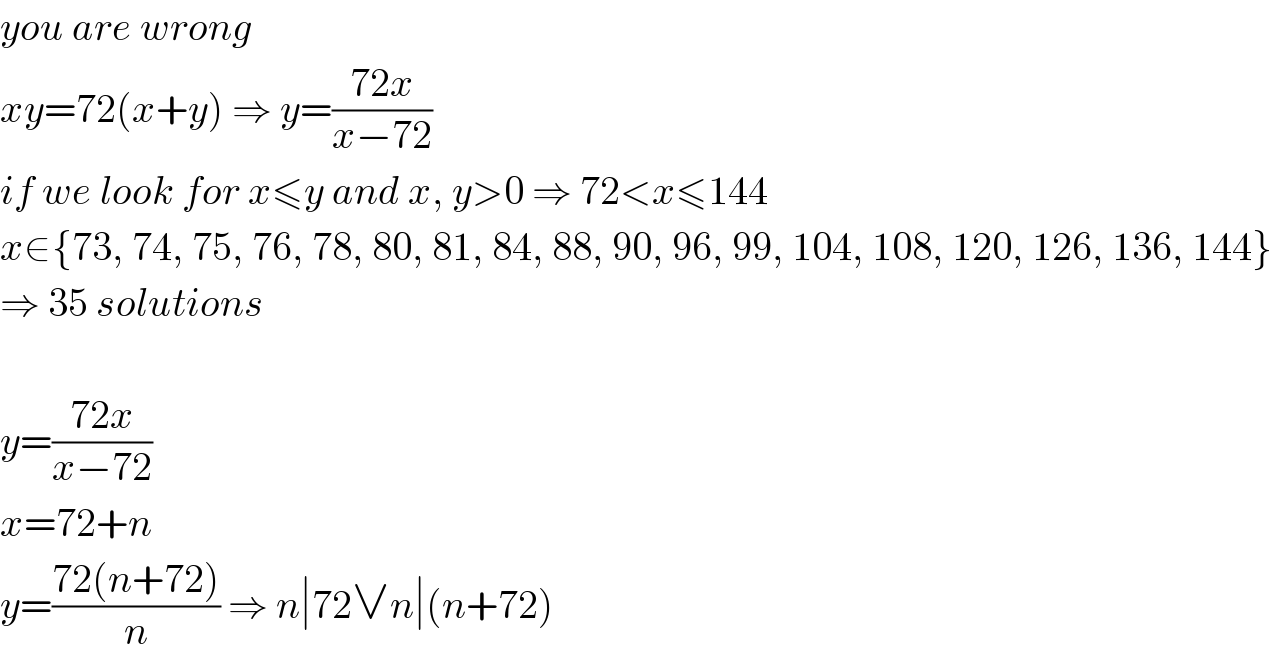
$${you}\:{are}\:{wrong} \\ $$$${xy}=\mathrm{72}\left({x}+{y}\right)\:\Rightarrow\:{y}=\frac{\mathrm{72}{x}}{{x}−\mathrm{72}} \\ $$$${if}\:{we}\:{look}\:{for}\:{x}\leqslant{y}\:{and}\:{x},\:{y}>\mathrm{0}\:\Rightarrow\:\mathrm{72}<{x}\leqslant\mathrm{144} \\ $$$${x}\in\left\{\mathrm{73},\:\mathrm{74},\:\mathrm{75},\:\mathrm{76},\:\mathrm{78},\:\mathrm{80},\:\mathrm{81},\:\mathrm{84},\:\mathrm{88},\:\mathrm{90},\:\mathrm{96},\:\mathrm{99},\:\mathrm{104},\:\mathrm{108},\:\mathrm{120},\:\mathrm{126},\:\mathrm{136},\:\mathrm{144}\right\} \\ $$$$\Rightarrow\:\mathrm{35}\:{solutions} \\ $$$$ \\ $$$${y}=\frac{\mathrm{72}{x}}{{x}−\mathrm{72}} \\ $$$${x}=\mathrm{72}+{n} \\ $$$${y}=\frac{\mathrm{72}\left({n}+\mathrm{72}\right)}{{n}}\:\Rightarrow\:{n}\mid\mathrm{72}\vee{n}\mid\left({n}+\mathrm{72}\right) \\ $$
Commented by Rasheed.Sindhi last updated on 05/Aug/20

$$\mathcal{T}{hanks}\:{madam}!\:{Now}\:{I} \\ $$$${recognized}\:{my}\:\boldsymbol{{logical}}\:\boldsymbol{{error}}. \\ $$$${The}\:{answer}\:{is}\:{not}\:{editable}\:{but} \\ $$$${it}'{s}\:{completely}\:{discardable}! \\ $$
